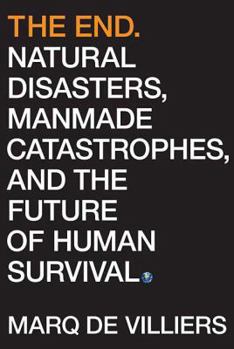The End: Natural Disasters, Manmade Catastrophes, and the Future of Human Survival
Select Format
Select Condition 
Book Overview
"What is the fate of the world as we know it?"Tsunamis, earthquakes, volcanoes, hurricanes, pandemics, cosmic radiation, gamma bursts from space, colliding comets, and asteroids--these things used to worry us from time to time, but now they have become the background noise of our culture. Are natural calamities indeed more probable, and more frequent, than they were? Are things getting worse? Are the boundaries between natural and human-caused calamities blurring? Are we part of the problem? If so, what can we do about it? In "The End, " award-winning writer Marq de Villiers examines these questions at a time when there is an urgent need to understand the perils that confront us, to act in such a way as best we can for the inevitable disasters when they come. We can do nothing about some natural calamities, but about others we can do a great deal. De Villiers""helps us understand which is which, and lays out some provocative ideas for mitigating the damage all such calamities can inflict on us and our world. "The End "is a brilliant and challenging look at what lies ahead, and at what we can do to influence our future.
Format:Hardcover
Language:English
ISBN:0312365691
ISBN13:9780312365691
Release Date:November 2008
Publisher:Thomas Dunne Books
Length:362 Pages
Weight:1.35 lbs.
Dimensions:1.4" x 6.5" x 9.5"
Customer Reviews
1 rating
How Long Can We Avoid The End?
Published by Thriftbooks.com User , 16 years ago
In an interesting and comprehensive book, de Villiers provides a look at all the potential catastrophes facing humanity, both those of our own doing and those we have no control over. /The End/ points out that we have been living at an unusually stable time in our planet's history, between ice ages, comet and asteroid strikes, and earthquake and volcano activity. There have been many periods of mass extinction throughout the ages, and there will be more to come. Our own activity may be exacerbating the warming situation, but according to de Villiers, unconstrained population growth is likelier to be a cause of crisis as we run out of room, resources, and create new potential for pandemics. While not a category of possible "ends" for human life, it is a good overview of all the natural and historic catastrophes we've been able to avoid thus far. He also finishes the book with suggestions on how we can lessen natural disasters and undo much of the damage we are currently causing. How much of it is practical, may not be determinable for years to come, but here is a good start to looking for ways to avoid our own potential extinction.





